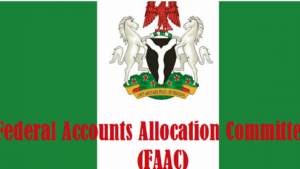How Federal Government and States Share N1.2 Trillion Amid Revenue Challenges
How Federal Government and States Share N1.2 Trillion Amid Revenue Challenges

The Federation Accounts Allocation Committee (FAAC) has announced the allocation of N1.203 trillion in revenue for August 2024, distributed among the Federal Government, State Governments, and Local Government Councils.
This information was revealed in a communiqué following FAAC’s September 2024 meeting in Abuja. The total distributable revenue comprises various sources, highlighting the government’s diverse income streams. Specifically, the allocation includes N186.636 billion in statutory revenue, N533.895 billion from Value Added Tax (VAT), N15.017 billion from the Electronic Money Transfer Levy (EMTL), and N468.245 billion from Exchange Difference revenue. Despite these figures, some revenue sources showed a decline compared to the previous month.
The total revenue available for distribution in August was reported at N2.278 trillion. However, after deductions for collection costs—totaling N81.975 billion—and other transfers amounting to N992.617 billion, the actual distributable amount was significantly reduced.
The gross statutory revenue for August reached N1.221 trillion, marking a drop of N165.994 billion from July’s total of N1.387 trillion. Similarly, gross VAT revenue fell to N573.341 billion, down by N51.988 billion from the previous month, indicating the volatility of key revenue sources tied to domestic consumption and taxation.
From the N1.203 trillion, the Federal Government received N374.925 billion, while State Governments and Local Government Councils received N422.861 billion and N306.533 billion, respectively. Additionally, N99.474 billion, representing 13% of mineral revenue, was allocated to oil-producing states.
Breaking down the allocations further: from the N186.636 billion statutory revenue, the Federal Government received N71.624 billion, while States and Local Councils got N36.329 billion and N28.008 billion, respectively. For the VAT revenue of N533.895 billion, the Federal Government received N80.084 billion, with States and Local Councils receiving N266.948 billion and N186.863 billion.
The N15.017 billion from the EMTL saw the Federal Government getting N2.252 billion, while States and Local Councils received N7.509 billion and N5.256 billion. From the Exchange Difference revenue of N468.245 billion, the Federal Government received N220.964 billion, with State Governments and Local Councils getting N112.076 billion and N86.406 billion.
The communiqué noted significant declines in various revenue sources, including Oil and Gas Royalty, Petroleum Profit Tax (PPT), VAT, Import and Excise Duties, and Companies Income Tax (CIT). These reductions reflect the broader economic challenges facing Nigeria, particularly in the oil sector, where fluctuating global prices and production issues persist. The decrease in VAT collections may also indicate reduced consumer spending and compliance issues.
As of August 2024, the balance in the Excess Crude Account (ECA), a crucial savings buffer for the nation during revenue shortfalls, stood at just $473,754.57, raising concerns about the country’s reliance on crude oil revenues for funding developmental and fiscal obligations.
The N1.203 trillion distributed for August underscores both the fiscal challenges Nigeria is navigating and the government’s efforts to manage revenue collection and allocation. The notable declines in statutory and VAT revenues compared to July emphasize the urgent need for more stable and diversified revenue sources to sustain the government’s financial commitments. Despite these hurdles, the revenue sharing ensures that all tiers of government have the necessary funds for governance and public service delivery, although ongoing reliance on traditional sectors like oil and gas remains a pressing concern.
TRENDING SONGS
 Trending Video: Muslim Man Joins Wife in Hallelujah Challenge ‘Dress Like Your Miracle’ Night
Trending Video: Muslim Man Joins Wife in Hallelujah Challenge ‘Dress Like Your Miracle’ Night
 Woman Seeks Advice as Late Brother’s Wife Refuses to Mourn Him Following His Death With Alleged Mistress
Woman Seeks Advice as Late Brother’s Wife Refuses to Mourn Him Following His Death With Alleged Mistress
 Nobody Cares About Fine Girls In The UK, I Miss Nigeria — Nigerian Lady Laments
Nobody Cares About Fine Girls In The UK, I Miss Nigeria — Nigerian Lady Laments
 Wedding Called Off: How Lady Cancels Wedding After Finding Out Finance’s Affairs With Her Bestie
Wedding Called Off: How Lady Cancels Wedding After Finding Out Finance’s Affairs With Her Bestie
 Heartbreak in Ikeja: Lady Weeps After Fufu Found in New Phone Package
Heartbreak in Ikeja: Lady Weeps After Fufu Found in New Phone Package
 Twist of Fate: Man Who Questioned Phyna’s ₦1Billion Demand Mourns Brother in Dangote Truck Crash
Twist of Fate: Man Who Questioned Phyna’s ₦1Billion Demand Mourns Brother in Dangote Truck Crash
 Tragedy in Enugu: Dangote Truck Claims Lives of Family of Five
Tragedy in Enugu: Dangote Truck Claims Lives of Family of Five
 Bangkok Crackdown: Nigerian-Thai Couple in Police Net Over Drug Trafficking
Bangkok Crackdown: Nigerian-Thai Couple in Police Net Over Drug Trafficking
 Family Rift: Reno Omokri’s Ex-Wife Says He Deserted Their Special Needs Son
Family Rift: Reno Omokri’s Ex-Wife Says He Deserted Their Special Needs Son
 The Man Who Sent Money for Two Decades, Only to Return to an Empty Shell
The Man Who Sent Money for Two Decades, Only to Return to an Empty Shell
Share this post with your friends on ![]()













